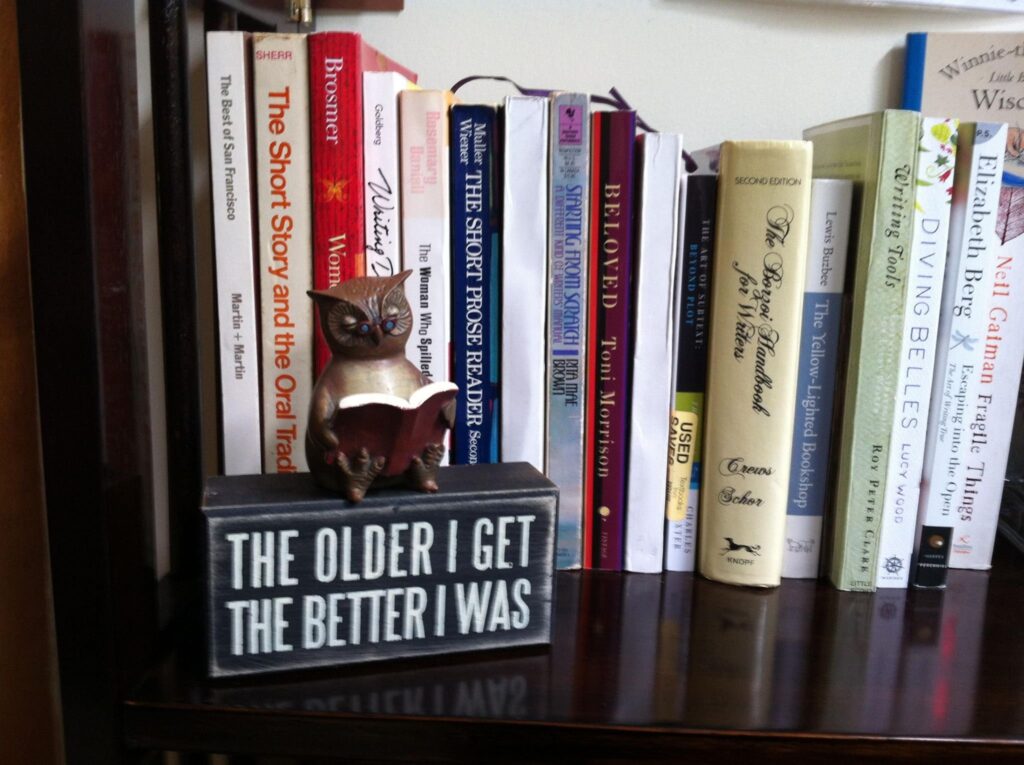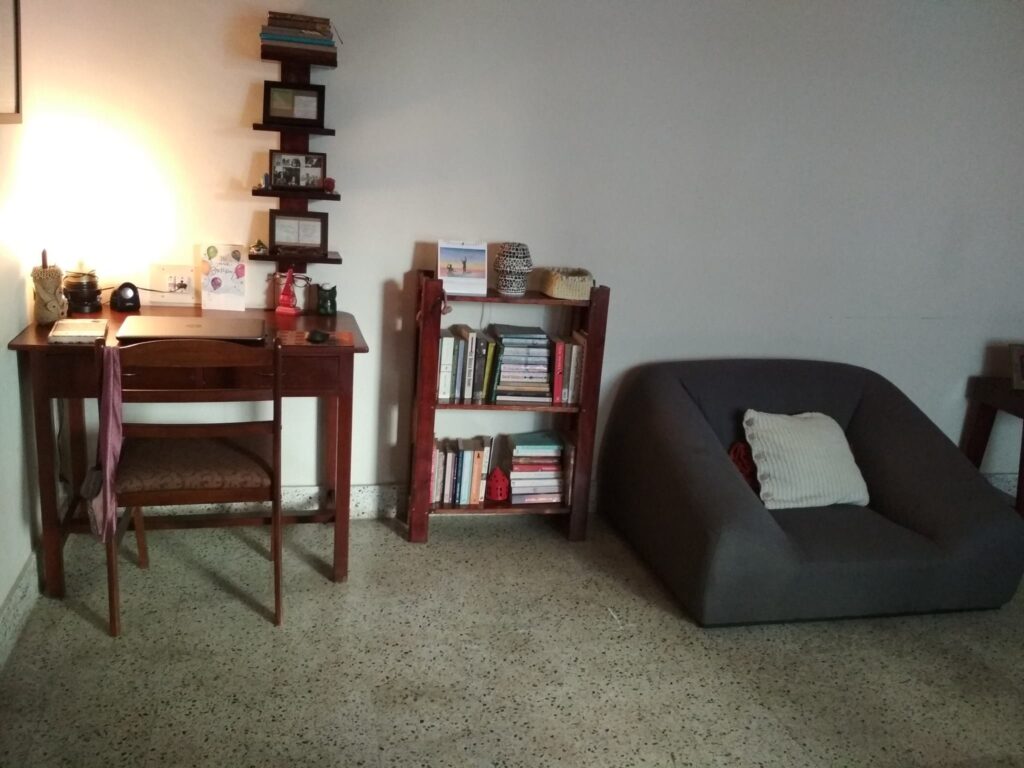He was cousin N, more uncle than cousin in terms of age, and he was as avuncularly indulgent as he could have been because of it. Portly is the word that best describes him. The fourth and fifth buttons on his shirt seemed to want to perennially pop, revealing the white vest within and thankfully not the umbilicus. Dark of complexion, with a minefield of skin tags erupting all over in a face that had mostly encountered blazing sun. Dark circles of uncared-for skin under his eyes that he seemed unaware of, and a reluctant moustache above his upper lip. He walked with a waddle that was in keeping with his girth, with a loped gait that was somewhat graceful in its ignorance of all the extra weight it carried. His gait was also surprisingly agile, not dawdling and uncertain as one would expect from a portly body such as his. He would announce himself with a booming laugh when he visited, and he was one of the few men in the family I always felt safe with.
He was the family foodie, his potbelly a standing joke that he himself perpetuated. At our annual family gathering in the village, where members from my father’s side of the family would gather for three days in the thin roofed barely upright structure that was our ancestral house, idle talk was usually about food and mostly about how much he could put away in one single meal. Two cooks would be hired for three days who would travel with us along with kerosene stoves (replaced by a gas cylinder during the later years), groceries and produce to last a group of 50 odd people for three days, an abundance of chatter about the lord’s forgiveness, and unvoiced dread at having to share one toilet and bathroom with the entire group for the duration of the stay. The women would pack their silk saris for the trip, the men their dhotis and cigarettes and playing cards, and the children? Arms swinging, eyes filled with images of the little ferris wheel at the local fair, eating mithais made of jaggery and coconut in copious amounts until our stomachs ached, and pretty much nothing else of true consequence.
These three days involved, for the carefree folk, hiking in the nearby mountains, (an activity I truly hated), eating several back-to-back meals in the name of the lord, popping antacids galore, and lazing by the lake near the temple until the cows came home. The path from the lake to the ancestral house was paved with pellets of goat shit and steaming piles of cow dung that we somehow had learned to navigate uneventfully in the absence of streetlights every evening, accompanied by shrieks and finger-pointing, guttural laughter at those who unwittingly stepped into one such pile. Pure wastreldom, not a single care in the world. After the evening puja was done, local minstrels would bring out their drums and gongs and beat a spirit-rousing rhythm well into the night, and cousin N would transform into this graceful gazelle post dinner, jiggling belly be damned: sweating buckets, not stopping to wipe his brow for hours together, as the music carried his spirit to places where his body could be free to move without fear of the mortal gaze. He inspired me, this divine devil, who knew no constraints and no fear when music played. This was pure emotion playing out in front of me.
For the older generation, it wasn’t as carefree. The womenfolk had to plan elaborate menus for the entire group as also locals who would drop in to visit and the homeless for whom these hot meals were manna from heaven. Because the lord needed to be visited before the temple opened up to tourists by mid-morning, and there was only one godforsaken bathroom, the womenfolk needed a bathing solution that was both ingenious and away from prying male eyes. My father, the eldest, proud patriarch, would escort all the women to the nearby reservoir – he was big brother to all the accompanying women — where the women would wade into the waters with their petticoats tied just under their armpits and bathe before the first rays of dawn illuminated them. My father would stand on the hill, gazing away from them to prevent any itinerant males from venturing closer, until the women were done and dressed and modest again. He would then ferry them back to the temple in the van he had brought along for the trip, just in time to hear morning bells peal and chants ring over the loudspeakers. I always accompanied him on these trips.
Vats of breakfast would be cooked by 8 am by the cook and his helper, and everyone would gather in the hall and sit cross-legged in front of banana leaves on which the cooks would serve piping hot idlis or upma, supervised by my mom, the equally proud matriarch. In the short time I knew her, I have never known a single soul who crossed our threshold to cross it again with an empty belly. There was always more than enough food to go around, never more on display than during these three days. Only later did I learn that she would willingly go hungry and eat mere morsels, often not at all, to make sure there was always enough food for those that came in hungry or needy.
Cousin N always sat by the door, his shirt stretched over his belly, buttons threatening to pop (they never did), and bloody hell, would he relish his food. I always sat across from him because he was one of my favourite people in the world then, and I was a rude little mongrel who found him funny. Pots of filter coffee would follow, and then the menfolk would retire into the inner room of our house to play cards and smoke cheroots and cigarettes, a fact that filled the womenfolk with shame that they dared not voice in front of their husbands. Once she was satisfied that no soul in the gathering was hungry, including the cook and his helper, my mother would wash up and go back to the temple, clad in another silk sari, to commune with the priest and ask him for a strand of jasmine from near the lord’s feet for her hair, sing songs to the lord, and pray to him for forgiveness for my father’s errant ways. He was gatekeeper of the collective female modesty of the gathering all right, but he was also the dealer of cards and supplier of cigarettes to his brethren, much to her chagrin.
Cousin N was a huge draw during these trips. He had the most mellifluous voice, the kind that belied the big gut it emerged from. During the day, when he wasn’t playing cards with the menfolk, he would be buying mithais for my generation from the local fair, regaling us with jokes and song that he would mostly sing under his breath until our demand crescendoed and rended the air so he was forced to sing louder just so I could hear him. My demands were the loudest of the lot. I did not yet know the word ‘no’ then. He would sing songs that Mohammed Rafi had sung for Shammi Kapoor during Bollywood’s golden era. Shammi Kapoor was cousin N’s matinee idol. Shammi Kapoor, probably the only true Bollywood hero who was romance personified, was also someone who was light on his feet despite his portliness. The only difference was that cousin N could sing his own songs.
The order of the world back then was marriage by 25, children by 28, and middle-age, mortgage, and diabetes by 30. Cousin N was newly married to Y, an otherwise unremarkable woman with milky white skin, her thick black hair tied loosely into a braid that cascaded down her back and settled on her hips, a red bindi in the middle of her forehead that announced her marital status, thick glasses with brown frames encasing her eyes. Female qualities that were sought after back then were the abilities to sing devotional songs, to cook meals with neither onion nor garlic, to blend into the background as much as possible, and to only whisper in response to the husband or mother-in-law when spoken to. Cousin N and his wife Y were still getting acclimated to one another after their wedding, and cousin N being cousin N, dragged me along for a walk by the lake with her. Or I may have precociously dragged myself along, I don’t remember. We sat on the ledge under the banyan tree in front of the lake, and I demanded that Y sing us a song. I was after all from the male side of the family, and my demands were to be met. She humoured me. In her barely audible voice, she sang a song to the lord, neither timbre nor tune registering in the evening breeze. And then because I knew cousin N sang much better, and because I was from the statured side in this equation, I demanded he sing a song. He initially hemmed and hawed and was lovably shy in front of his wife, whose gaze was obstinately focussed on an ant that was traversing its circuitous path near her foot. And then cousin N began to sing.
Mm-hmm-hmm, o-ho-ho, a-ha-ha. Mm-hmm-hmm, mm-hmm-hmm, a-ha-ha. Yeh dekh ke dil jhooma. Diwana hua badal, a romantic duet from Kashmir Ki Kali. When he neared the words, Yeh dekh ke dil jhooma – “the heart revels on seeing this” – his eyes closed, his head tilted back, his voice softened, and he sang to the wind. And for the first time in the time that I had known her, Y lifted her head and looked at her husband. And then he opened his eyes, and he looked into hers.
They are both no more, and I don’t really know their children beyond their names, but this moment that I witnessed remains with me, and came to me in my dreams last night, and I just had to write about it.
(From 2020)



